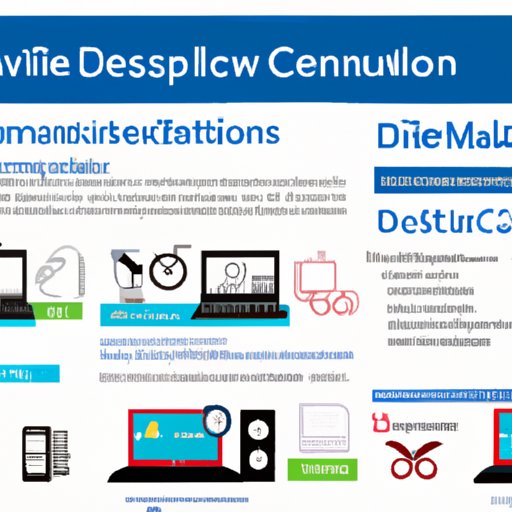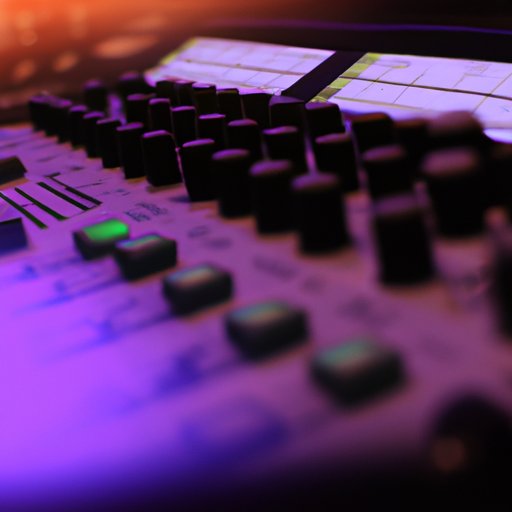Introduction
Music technology is an interdisciplinary field that combines elements of music, computer science, and engineering. It is used to create, record, mix, and manipulate sound for a variety of applications, including music production, sound design, live performance, and multimedia. A music technology degree can provide students with the knowledge and skills necessary to work in this rapidly growing industry.
The benefits of pursuing a music technology degree are numerous. Students will gain an understanding of the principles of music, technology, and engineering, as well as the ability to apply these concepts to real-world settings. They will also develop technical and creative skills that will help them stand out in the job market. In addition, they will have the opportunity to explore various career paths within the music technology field.

Explore Career Opportunities in Music Technology
A music technology degree can lead to a variety of career paths, from audio engineering and music production to sound design and multimedia. According to the U.S. Bureau of Labor Statistics, employment of audio engineers, producers, and directors is projected to grow 8% from 2019 to 2029, faster than the average for all occupations.1
When looking for a job with a music technology degree, it’s important to consider the type of position you are interested in and the employer’s requirements. Many employers look for candidates with experience in specific software programs or audio equipment, so having a strong background in these areas can be beneficial. Additionally, networking with people in the industry can help you get your foot in the door. Finally, building a portfolio of your work is essential for showcasing your skills and demonstrating your capabilities.

Understand the Role of Music Technology in Education
Music technology has become an integral part of education in recent years, as it has been shown to enhance learning in various ways. Studies have found that using music technology in the classroom can improve student engagement, increase motivation, and even boost academic achievement.2
Examples of music technology used in education include digital audio workstations, virtual instruments, and interactive software. These tools can be used to teach a range of topics, from basic music theory and composition to advanced sound design and mixing techniques. Additionally, students can use music technology to create their own compositions and recordings, which can be a great way to foster creativity and self-expression.

Develop Skills for Working with Audio and Visual Technologies
In order to work with audio and visual technologies, students must have a solid understanding of the fundamentals of sound and image manipulation. This includes learning how to edit audio, create effects, and mix and master tracks. Additionally, students should be familiar with various types of audio and video hardware, such as microphones, speakers, and cameras.
One of the most important things to keep in mind when working with audio and visual technologies is the importance of paying attention to detail. This means taking the time to make sure that all the components of a track are balanced and properly mixed. Additionally, it’s important to be aware of the different types of audio and video formats, as each one has its own set of characteristics and needs to be handled differently.
Learn How to Produce Music Professionally
Learning how to produce music professionally is another important skill for those with a music technology degree. This involves understanding the different aspects of music production, from recording and arranging to mixing and mastering. Additionally, students should have an understanding of the business side of music production, such as how to promote and market their work.
Producing music professionally requires a combination of technical and creative skills. Technical skills include knowledge of audio engineering, music theory, and software programs. Creative skills involve having an ability to think outside the box and come up with unique ideas. Furthermore, having an understanding of the current trends in the music industry is essential for staying ahead of the competition.
Create Innovative Music Technology Solutions
With a music technology degree, students can explore new ways to use technology to create innovative solutions for the music industry. This could include developing new software programs, creating interactive music experiences, or finding ways to use existing technologies in novel ways.
To create innovative music technology solutions, students must have a deep understanding of the industry and the latest developments in music technology. Additionally, they must possess problem-solving and critical thinking skills, as well as the ability to think creatively and come up with out-of-the-box solutions.
Use Music Technology to Enhance Live Performances
Live performances are an important part of the music industry, and music technology can be used to enhance these events in a variety of ways. This could include using lights and visuals to create immersive environments, utilizing sound reinforcement systems to improve the audio quality, and incorporating interactive elements to engage the audience. Additionally, music technology can be used to stream live performances online, allowing viewers to experience the show from anywhere in the world.
When using music technology for live performances, it’s important to consider the type of event and the equipment available. Additionally, it’s essential to have a thorough understanding of how to operate the technology, as any mistakes could potentially ruin the show. Furthermore, having a good understanding of the audience’s expectations and how to meet them is key for creating a successful show.
Conclusion
A music technology degree provides students with the knowledge and skills necessary to work in the music industry. With this degree, students can explore a variety of career paths, from audio engineering and music production to sound design and multimedia. Additionally, they can use music technology to enhance their educational experience and develop their technical and creative skills. Furthermore, they can learn how to produce music professionally and create innovative music technology solutions. Finally, they can use music technology to enhance live performances.
Overall, a music technology degree can open up a world of possibilities for those looking to pursue a career in the music industry. With the right knowledge and skills, graduates can take advantage of the many opportunities available and make their mark on the world of music.
(Note: Is this article not meeting your expectations? Do you have knowledge or insights to share? Unlock new opportunities and expand your reach by joining our authors team. Click Registration to join us and share your expertise with our readers.)
